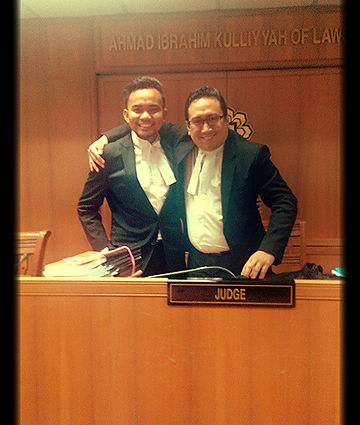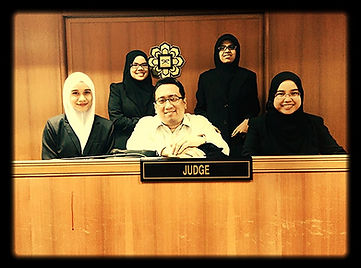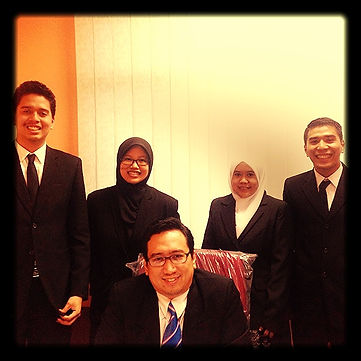The Concept

The Visions & Missions:
Lee Schulman, a co-author of the Carnegie Report (2007) and author of “Signature Pedagogies in the Professions,” in Daedalus 52 (Summer 2005)and a former professor at Stanford U. has observed that preparing students for the professions requires not only thinking critically, but also acting and performing with integrity.
The ideas of action and performance are not new, but when held up alongside critical thinking, they create a nice trilogy of legal education outcomes. Acting is how lawyers interact with others, prepare, and behave while working, AND performing is when a lawyer is engaged in a law practice activity requiring competency, such as oral argument, examining a witness in an in chamber hearing or trial, or mediating a dispute.
As an academician in legal education, I believe very strongly that we should be teaching students to do these things throughout law school, starting on the very first day of the first year of school, woven throughout doctrinal courses as well as clinical and legal writing offerings. In fact, learning science supports this integration. In learning science, it has been shown that engaged learners perform better. Creating deliverables is a way to engage students in a positive fashion. Deliverables such as, “Do a direct examination of the plaintiff in this case,” or “Take a picture of an easement on real property and explain why,” or, “Write down ten questions you would have of the plaintiff in this case if you were able to ask them,” are just some illustrations of deliverables. Role-playing generally falls within the rubric of a deliverable, since students must give a performance as an attorney, judge, witness or other person – just not as a student.
By adopting this approach, I hope that I will be able to teach my students the relevant skills in legal practice in a more effective way, namely by involving them in legal practice works and by providing them the opportunities to do those works themselve, and learn from their mistakes. I believe that this 'learning by doing' method is more effective in making the students understand civil procedure. Through simulations in which each student has opportunities to practice fundamental lawyering skills as negotiation, oral advocacy and communication, through client interviewing and counseling, cause papers drafting, critical thinking and problem solving, they will learn to think and act like a lawyer even before they become one. Through these activities, students will also be able to learn how practicing lawyers address difficult ethical and professional problems, manage their practices, and balance their professional and personal lives.
~Dr Shahrul Mizan Ismail
The Operation Mechanisms:



THE COURT
The mock court, otherwise known as the 'Mahkamah Mut IIUM' in many aspects resembles the real court in Malaysia. It is of course impossible to create an exact replica of the actual court, but Mahkamah Mut IIUM has been made to follow, as much as possible, the standard operating procedures and administration system of the Kuala Lumpur Court, especially in relation to filing procedure, storage of case files, file search & extraction procedures.
Features:
-
E- Filing
-
Manual Filing
-
File Search
-
Extraction of Documents
-
BC Boxes
-
Court's Official Seal
-
Enclosure No. on all documents
-
Case Number (following the actual court's coding of cases)
-
Case management sessions
-
Judge's chamber
-
Registrar's Cubicle
-
Trial Courts (following the layout of the real courts)
THE LAW FIRM
Throughout the semester, the students will not be treated as students. Instead, they will be treated as lawyers who work in a legal firm and I will be the managing partner of the firm. They will not be attending tutorials, but firm's meetings where I, as the managing partner of the firm will be asking them for progress of the cases that they handle and will in turn advice them on how to proceed with the case. The firm's meeting will resemble a real firm's meetings and they will treat the meeting as such. During the meeting, I will also be pinpointing the mistakes that they did and explain to the rest of the class on what should be done to remedy those mistakes and how to avoid them in the future.
The firms will operate like normal law firms. They will have their own letterheads, bills, files, reference numbers etc. Each branch office (each group) will be opening files for new clients and will be maintaining the files all throughout the semester. Each file will have 5 subfolders in them, namely, 'Cause Papers / Pleadings', 'Correspondences', 'Bills & Receipts', 'Documents' and 'Drafts'. The groups will have the obligation to maintain all the aforesaid subfolders. In maintaining them, the groups are expected to keep all receipts for disbursement purposes, and to bill the client from time to time. They are also expected to keep all correspondences related in the case files.
THE CLIENT
Each group of students will be given a 'real' client to handle. The client will be interacting with them through email. This will teach them how to console and counsel a client. Things that they should look out for and be aware of in dealing with clients. The experience will also expose them to several soft skills such as email writing (how to write appropriate emails to clients), customer service skills, public relation skills, the art of persuasion etc. It will also impart in them some legal and advocacy skills such as legal advising, decision making and negotiation skills.
I will be playing the role of the client and I will be acting like a real client, following the traits of normal clients in real cases. Sometimes I would be professional. Other times I would be pushy and cranky. Students will have to learn how to handle me as their client.